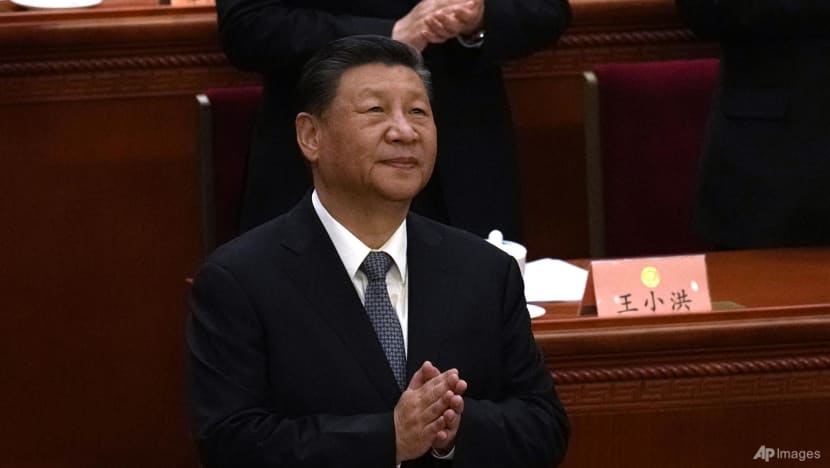Xi Jinping: China’s president of precedents and new norms, but at what cost?
The canning of the premier’s press conference at the two sessions is the latest in a series of precedent-setting steps taken under President Xi Jinping since he took power.

Chinese President Xi Jinping applauds during the opening session of the Chinese People's Political Consultative Conference in the Great Hall of the People in Beijing, Mar 4, 2024. (Photo: AP/Ng Han Guan)

This audio is generated by an AI tool.
SINGAPORE: A signature event will be conspicuously missing when China’s most important annual political meetings come to a close on Monday (Mar 11) - Premier Li Qiang will not be speaking to the press.
Since 1993, the premier’s press conference has capped the two sessions, allowing international media a rare chance to put questions to one of China’s senior leaders.
The premier is usually ranked second or at least third in the Chinese Communist Party’s (CCP) apex Politburo Standing Committee.
Also, the press event offers the outside world a window into the leader’s priorities and personality.
But three decades of tradition have been upended with Monday’s announcement that the meet-the-press session would be scrapped this year and likely till 2027.
While the move came as a surprise, it’s but the latest in a series of precedent-breaking steps taken under President Xi Jinping’s watch since he emerged as China’s supremo in 2012.
As Mr Xi - who heads the CCP, the military and the state - rewrites China’s rulebook, analysts say a consolidation of power is among the key objectives.
“The trajectory of Xi overseeing everything is now the norm,” political scientist Chong Ja Ian at the National University of Singapore (NUS) told CNA.
This state of play - where power is centralised under Mr Xi - is a double-edged sword, China scholars note. While it means Mr Xi can move at speed and mobilise government resources to tackle issues he deems important, it could also diminish initiative at other levels of government in resolving problems.
THE PRESIDENT OF PRECEDENTS
Topping the list of norm-shattering actions was Mr Xi formally being handed a historic third presidential term at last year’s two sessions, cementing his status as China’s most powerful leader since Mao Zedong.
The roughly 3,000 members of the National People’s Congress voted unanimously for him in an election in which there was no other candidate.
It was the latest feather in a packed cap that saw Mr Xi securing a record third term as CCP head months before.
The road to the 2023 milestone had already been paved five years back when a long-established two-term limit was abolished from the constitution, effectively allowing Mr Xi to remain in office indefinitely.
The move scrubbed what former top leader Deng Xiaoping had inscribed 36 years ago, six years after Mao Zedong’s death, to institutionalise leadership succession and avoid a return to one-man rule.
At the same time that term limits were done away with in 2018, Mr Xi’s political theories were enshrined in China’s state constitution.
Known as “Xi Jinping Thought on Socialism with Chinese Characteristics for a New Era”, it had been threaded into the CCP charter a year back.
This effectively placed Mr Xi in similar halls as Deng and Mao, both of whom had their names included in their banner terms.
The pet ideologies of other former Chinese supremos such as Jiang Zemin’s “Three Represents” and Mr Hu Jintao’s “Scientific Outlook on Development” were added to the party constitution as well, but not with their names.
“The inclusion of Xi's thought into the country's fundamental law reflects the common aspiration of the entire Party and all Chinese people of various ethnic groups,” said senior legislator Shen Chunyao at the time.
SHATTERING PRECEDENTS
Even before this, President Xi had, in a way, already been placed on par with the two late paramount leaders.
He was proclaimed the CCP’s “core” leader in a formal document during a top-level party meeting in 2016, solidifying his authority and influence. This description was previously applied to Mao and Deng, as well as the late former leader Jiang.
Mr Xi’s standing was further burnished at the 20th Party Congress six years on when his “core position” in the Central Committee was endorsed.
The quinquennial event saw traditions being broken by Mr Xi, such as a longstanding de facto age cap for top officials known as “qi shang ba xia” (directly translated to “seven up eight down”).
The unwritten rule means that those 67 years old or younger on the day of the party congress can stay on or take up new positions, while those 68 or above have to retire.
This ended up being shattered when a handful of those past the threshold were retained, such as top military general Zhang Youxia (72 at the time) and Foreign Minister Wang Yi (69 at the time).
Mr Xi himself led the way, being 69 years old as he was reappointed party chief for a third time at the 2022 event.
At the same time, the lineup of the Politburo, the second-highest decision-making body in the party, raised eyebrows. It shrank by one seat to 24, with no woman in the group for the first time in 25 years after Vice Premier Sun Chunlan bowed out.
The makeup of the Politburo’s elite seven-member standing committee also generated discussion, with analysts and commentators noting that those appointed are close allies of Mr Xi, sharing extensive career overlaps or prior ties.
For example, three of the men - Premier Li Qiang, chief of staff Cai Qi and anti-corruption watchdog head Li Xi - are part of the so-called “New Zhijiang Army” who worked under Mr Xi in Zhejiang province during his political ascent.
The reinvigoration of leading small groups (LSG), or “ling dao xiao zu”, has also been observed under Mr Xi. These CCP constructs operate above and beyond formal party and state structures and determine policy guidance for government channels, according to a 2020 article published by the US-based think tank Jamestown Foundation.
A 2017 analysis by the Center for Strategic and International Studies estimated just over 80 of these groups in operation. About 30 were created under Mr Xi’s watch, the report stated.
The groups have become far more centralised under Mr Xi, according to the Jamestown Foundation article, which added that the Chinese leader personally chairs at least half of the currently operating major committees.
POWER TO THE PERSON
The multiple breaks with tradition are part of Mr Xi’s drive to consolidate power under the CCP with him at the helm, say analysts.
“It seems that Xi is doing what he deems necessary to further centralise power and secure his legacy of making China great in both domestic and external arenas,” ISEAS Yusof-Ishak Institute senior fellow Lye Liang Fook told CNA.
Legislation has even been amended to this effect. For instance, recently passed revisions to China’s state secrets law have inserted a clause mandating adherence to the leadership of the party in protecting state secrets.
A similar clause requiring adherence to the CCP’s leadership as well as safeguarding the authority of the party’s Central Committee has been included under draft amendments to another piece of legislation, the State Council Organic Law.
The revision to this law would be the first since it was adopted in 1982 when the current state Constitution was formulated, reported state news agency Global Times.
“These centralising moves are now the precedent,” Dr Chong, who is an associate professor at NUS’ Department of Political Science, told CNA.
“They mean that Xi has oversight over all major developments and all decisions go through him, for better or worse.”
GETTING THINGS DONE
Analysts agree that there are merits to the ruling party and the president’s outsized influence in the world’s second-largest economy, home to some 1.4 billion people.
It allows Mr Xi to decide and move at speed on issues he considers important, said Mr Lye from ISEAS Yusof-Ishak Institute.
Taking the ailing property sector as an example, Mr Lye, who specialises in Chinese politics, referred to how China took “relatively quick action” to ease the pressure.
The industry powers about a quarter of the country’s economy, according to a China Daily report in January. But it has been under mounting strain from a debt crisis, falling prices and oversupply of homes.
Since last year, Beijing has rolled out a series of measures to arrest the slide. Among the steps taken was authorising banks to extend loans to a whitelist of property projects.
Separately, a sweeping anti-corruption effort driven by President Xi since taking power more than a decade ago has sustained its momentum, standing out both for its sweeping reach and how far up the ranks it has stretched.
The highest-profile casualty was Zhou Yongkang, who was brought down early on in the graft-busting effort. Before his downfall in 2012, he was a Politburo Standing Committee (PSC) member and national security chief.
Zhou’s case shattered the taboo against investigating retired members of the PSC, breaking an unspoken rule - known in Chinese as “xing bu shang chang wei” - of letting them enjoy their golden years in peace.
More recently, in terms of the numbers, the Global Times reported in 2022 that the anti-graft watchdog had punished some 4.7 million people as of April that year.
That the anti-corruption drive has endured till now is a testament to Mr Xi’s growing influence over the party and state, say analysts.
From the perspective of the party elite, the political status quo also affords more stability, Dr Lim Tai Wei, an adjunct senior fellow at NUS’ East Asian Institute, told CNA.
“(To them), there is certainty in the command structures, and less avenue for alternative lobbying capacity or rival factional strife,” added Dr Lim.
A DOUBLE-EDGED SWORD?
But centralising power under the party and Mr Xi is a double-edged sword, observers note.
“In some ways, looking at the People’s Republic of China politics is easier. It is all about Xi,” said NUS’ Dr Chong.
“However, that also means decision-making processes are more opaque and subject to the whims of one person.”
Similarly, Mr Lye from ISEAS-Yusof Ishak Institute told CNA the moves have made it more challenging to access or understand China's politics and policies, especially for the outside world.
“Issues which can be readily understood or addressed by approaching it from a purely technocratic or problem-solving approach have now given way to a higher order priority that includes maintaining the Party's primacy in various fields and upholding national security,” he added.
Pointing out that the line between party and state has become increasingly blurred, Mr Lye noted a potential impact on troubleshooting national challenges.
“With the party intruding into government work areas, (this) would likely make it difficult for technocrats, who are regarded as the real subject matter experts, to take practical measures and actions.”
As the party-state divide narrows further, Mr Lye said it could result in CCP-driven remedies being administered to existing socio-economic challenges, which are “seemingly best left to subject matter experts to handle”.
“In the best-case scenario, such remedies may result in a quick and temporary redress.
“(But) there is also a possibility that they could just be pushing the can down the road, resulting in deeper and far-reaching consequences later.”
Either way, experts expect more traditions to topple as authority and influence continue to be consolidated under President Xi.
“(China) has evolved from a Maoist system to a collective leadership system with a paramount leader and now to a core leader, strongman centralised system,” NUS’ Dr Lim told CNA.
At some point, Xi’s moves to centralise power lose their “unprecedented” nature, said Dr Chong.
“Centralising authority around Xi is no longer rule-breaking.”






















